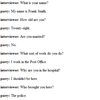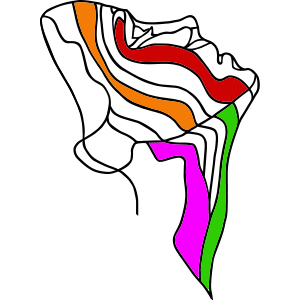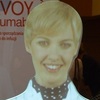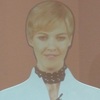

Chatbot listing, virtual agents, virtual assistants, chat bot directory, conversational agents, virtual human news, chatterbot list
NEWS: Chatbots.org survey on 3000 US and UK consumers shows it is time for chatbot integration in customer service!read more..
Parry

|
Parry is natural language program that simulates the thinking of a paranoid individual. This thinking entails the consistent misinterpretation of others motives – others must be up to no good, they must have concealed motives that are dangerous, and their inquiries into certain areas must be deflected - which Parry achieves via a complex system of assumptions, attributions, and "emotional responses" triggered by shifting weights assigned to verbal inputs.
Parry was the first to pass the Turing Test - it was in the early seventies, when human interrogators, interacting with the program via remote keyboard, were unable with more than random accuracy to distinguish Parry from an actual paranoid individual. Additional comments by developer Kenneth Mark Colby: Fifty years ago there was only one psychiatrist thinking about the ways in which computers could contribute to the understanding of mental illness: Kenneth Mark Colby. Thus began a project that lasted until his death in 2001. Kenneth Colby graduated from Yale University in 1941 and from Yale Medical School in 1943. He practiced psychoanalysis for the first several decades of his career, and was clinical associate at the San Francisco Institute of Psychoanalysis. But Colby became disenchanted with psychoanalysis because, in his view, it failed to satisfy the most fundamental requirement of a science, that being the generation of reliable data. In 1961 he spent a year as a Fellow at the Center for Advanced Study in the Behavioral Sciences, where he developed several of the ideas that were to inform the rest of his career. Among these was the conviction that computer models of the mind promised a more scientific approach to the study of cognitive processes and their aberrations. Following this conviction, he joined the Department of Computer Science at Stanford University in the early sixties, and soon became a pioneer in the emerging field of artificial intelligence. In 1967 the National Institute of Mental Health recognized his research potential when he was awarded a Career Research Scientist Award. At the Stanford Artificial Intelligence Laboratory, Colby created a natural language program called “Parry” that simulated the thinking of a paranoid individual. This thinking entails the consistent misinterpretation of others motives – others must be up to no good, they must have concealed motives that are dangerous, and their inquiries into certain areas must be deflected - which Parry achieved via a complex system of assumptions, attributions, and “emotional responses” triggered by shifting weights assigned to verbal inputs. This program was the first to pass the “Turing Test” (named for the British mathematician Alan Turing, who defined as “intelligent” any computer that could successfully impersonate a human in a typed “conversation”). Parry did so in the early seventies, when human interrogators, interacting with the program via remote keyboard, were unable with more than random accuracy to distinguish Parry from an actual paranoid individual. Professor Colby came to UCLA as a professor of psychiatry in 1974, at the invitation of Jolly West, M.D., then chair of the Department of Psychiatry and director of the Neuropsychiatric Institute. He was jointly appointed professor in the Department of Computer Science a few years later, and continued to work on the theory and application of artificial intelligence in neuropsychiatry. During his tenure at UCLA Colby published important theoretical works on the unreliability of diagnosis in psychiatry, on cognitive science and psychoanalysis. He was one of the first to appreciate the possibilities of computer-assisted psychotherapy, and with his son Peter created a program called “Overcoming Depression,” which included a natural language component that administered a version of “cognitive-behavioral” therapy for depression. He and Peter formed Malibu Artificial Intelligence Works in 1989, and they continued to develop and market “Overcoming Depression” until Professor Colby’s death at age 81, on April 20, 2001. |














 Grey out:
Grey out: